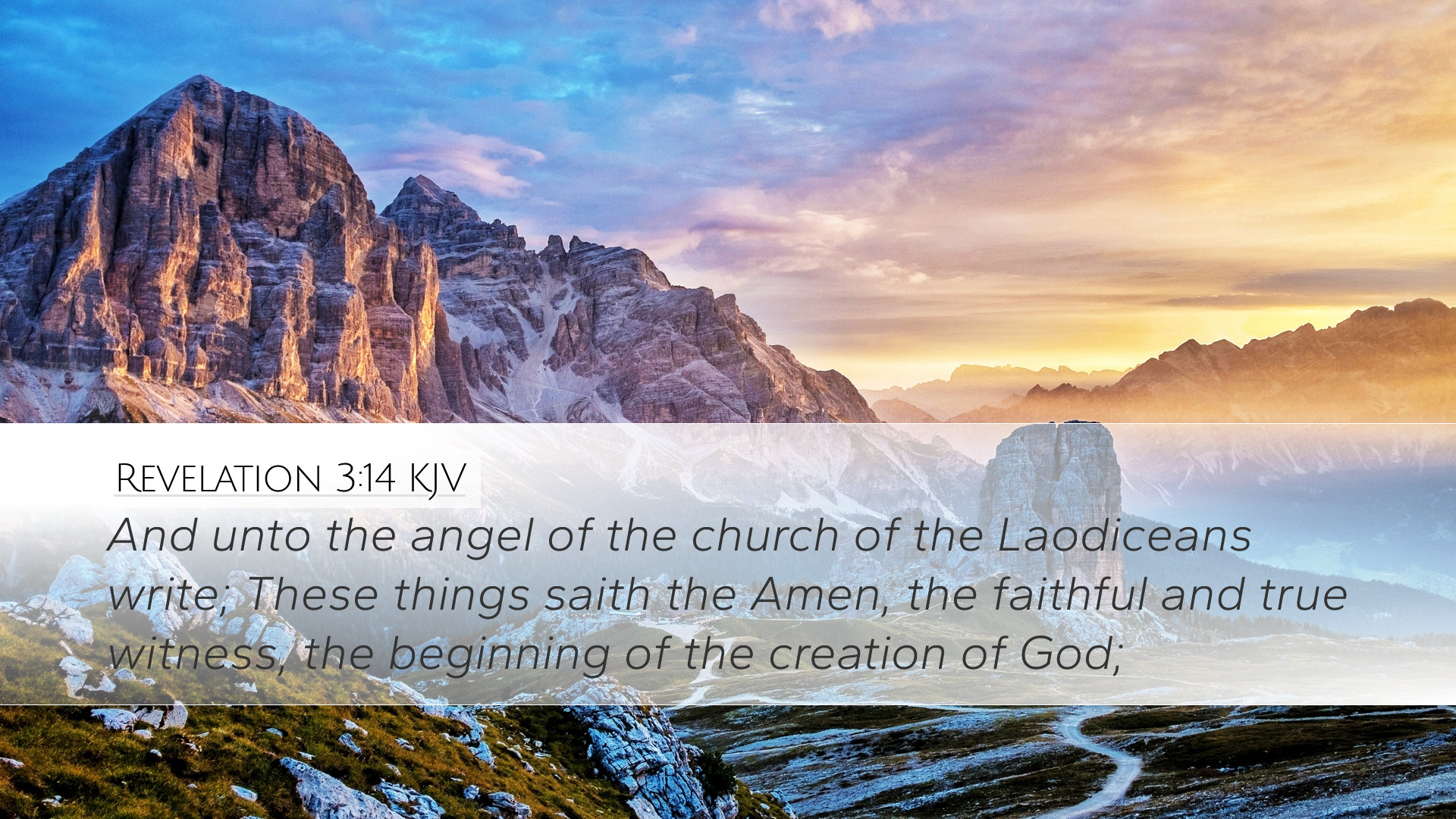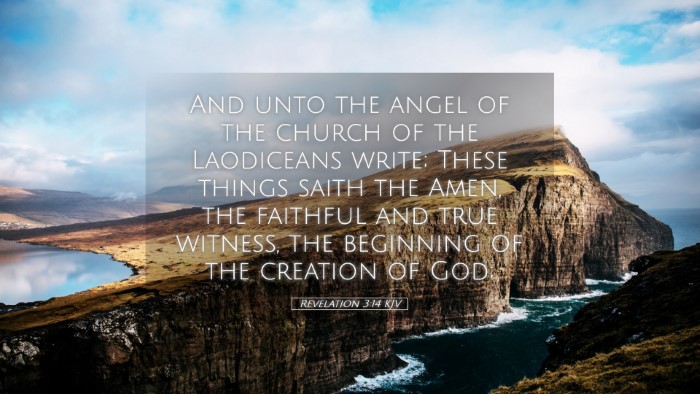Commentary on Revelation 3:14
Revelation 3:14 presents a significant message to the Church of Laodicea, described as the "faithful and true witness," which serves as a profound exploration of Christ’s character and the condition of the church. This commentary weaves insights from notable public domain sources including Matthew Henry, Albert Barnes, and Adam Clarke, capturing the theological and practical implications of this verse.
Context and Background
The letter to the church in Laodicea is part of the broader context of the seven letters to the churches of Asia Minor found in Revelation 2 and 3. Laodicea was a wealthy city known for its banking, medicine, and textile industries, which contributed to a self-sufficient attitude among its inhabitants. The church in Laodicea reflects both the state of complacency in faith and the danger of spiritual lukewarmness.
Exegesis of Revelation 3:14
Revelation 3:14 states:
"And to the angel of the church of the Laodiceans write: 'These things says the Amen, the Faithful and True Witness, the Beginning of the creation of God.'"
1. The Title of Christ: 'The Amen'
This title signifies the absolute truth and faithfulness of Christ. Albert Barnes elaborates that “Amen” is the affirmation of all God’s promises. It stresses the certainty and reliability of Christ’s words and actions, contrasting with the lukewarmness of the Laodiceans.
2. Christ as the 'Faithful and True Witness'
In this description, there is a call to understand Christ's authority as the one who bears witness to the truth. Matthew Henry emphasizes that this witness signifies His fidelity to His role and the truths He represents. He faithfully speaks on behalf of God, revealing the spiritual condition of the church. Adam Clarke elaborates on the implications of being a ‘true witness,’ stating it refers to Christ's unwavering commitment to the truth before both God and humanity.
3. 'The Beginning of the Creation of God'
This title affirms Christ’s sovereignty over all creation, indicating His preeminence and role in the cosmic order. Henry notes that this phrase does not imply Christ was created but emphasizes His authority as the source of all that exists. Clarke further explains that it points towards Christ’s role in creation and the essential truth of His divinity. This assertion serves as a reminder to the Laodiceans of who they are truly worshiping.
The Spiritual State of the Laodicean Church
Analyzing the spiritual condition of Laodicea, it is clear that they are characterized by complacency and self-reliance. While they are materially wealthy, spiritually, they are poor and blind.
Lukewarmness in Faith
The metaphor of being 'lukewarm' underscores their indifference toward spiritual matters. Barnes comments that lukewarmness is particularly displeasing to God. This suggests a desperate need for the congregation to recognize their state and abandon their complacency, evidenced by the admonishment that Christ will 'spit them out of His mouth.'
Self-Deception and Call to Repentance
Laodicea prides itself on being rich and in need of nothing, yet in reality, they are poor and blinded. Henry elaborates that their self-assessment is drastically out of sync with Christ's evaluation. This profound deception serves as a warning to all believers about the dangers of spiritual arrogance. The faithful witness, in contrasting their actual state, calls them to repentance and renewal.
Theological Implications
This verse has numerous implications for contemporary theology and ecclesiology. The call to recognize Christ’s identity and authority serves not just as a rebuke for Laodicea but as a vital lesson for the church today.
1. Christ’s Authority and Truthfulness
The clarity with which this passage identifies Christ’s position compels the church to adhere to His teachings and repent where necessary. Church leaders and members alike are reminded of the importance of being aligned with Christ's truth in all aspects of life and ministry.
2. The Necessity of Spiritual Vigilance
Lukewarmness indicates a lack of vigilance which can be pervasive in today's context. The passage implores church leaders, theologians, and scholars to pursue a fervent and intimate relationship with Christ, preventing the normalization of complacency that hinders spiritual growth.
3. The Call to Repentance
The implication of repentance runs deep. The church must be willing to cast aside superficial metrics of success and evaluate their spiritual health critically. This call is especially poignant for pastors and Bible scholars dedicated to sound doctrine and integrity within the congregation.
Practical Applications for Today's Church
The insights gleaned from Revelation 3:14 can inform various aspects of church life and leadership.
- Self-Evaluation: Churches should regularly engage in self-assessment, using scriptural truths as a mirror to reflect their spiritual condition.
- Embracing Vulnerability: Leaders should foster an environment where church members can express their struggles without fear of condemnation, promoting a culture of repentance and healing.
- Pursuit of Holiness: Pastors must instill a vision of what it means to live out one’s faith passionately and authentically.
- Community Engagement: Encouraging congregations to serve outwardly can help counteract complacency and cultivate a genuine love for others.
Conclusion
Revelation 3:14 serves as both a warning and encouragement to the church. Through the faithful and true witness of Christ, we are reminded of who He is and what He demands from His followers. It calls for a return to authenticity in faith, a rejection of lukewarmness, and a renewed commitment to live in accordance with the truths of Scripture. May this verse transform our understanding of Christ and compel us to a deeper relationship with Him and with one another.


